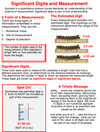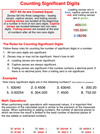Notes:
The Significant Digits and Measurement Concept Builder is an adjustable-size file that displays nicely on smart phones, on tablets such as the iPad, on Chromebooks, and on laptops and desktops. The size of the Concept Builder can be scaled to fit the device that it is displayed on. The compatibility with smart phones, iPads, other tablets, and Chromebooks make it a perfect tool for use in a 1:1 classroom.
Teaching Ideas and Suggestions:
We're going to be honest: we do Physics. That's why this is called The Physics Classroom website. And when we do the Teacher's Notes section for our Concept Builders, we typically have a lot to say ... and a lot of resources to point you to. We're not claiming to be ignorant of chemistry; we just don't have a lot of resources here at The Physics Classroom to point you to. And so this page is going to be a lot shorter than our usual page that accompanies our Physics Concept Builders. That's our honest confession.
Most chemistry courses begin with a discussion of fundamental skills that will be used for the entirety of the course. One of those skills involves the making and reporting of a proper measurement. One of the struggles students have with measurement is the reporting of the measurement to the proper number of signicant digits. This Concept Builder addresses this struggle. The need to provide an estimated digit ... even if it is a 0 ... is emphasized. Each question in the Concept Builder has a Help Me! button which links to a page that discusses the question and provides background information about measurement, estimated digits, significant digits, and the counting of significant digits. The guts of these Help pages is two graphics that explain the importance of the estimated digit and the significance of zeroes:


Like all our Concept Builders, this Concept Builder utilizes a variety of strategies to make each student's experience different. The ordering of questions is random. The Question number assigned to each question is scrambled. For instance, two side-by-side students will not have the same question for question number three. And questions are organized into "groups" with questions within the same group being very similar (for instance, they have the same type of information as "givens") but not identical.
The Concept Builder also keeps track of student progress. It requires that students demonstrate a mastery of questions in each Question Group. If they miss a question from one group, then they will have to answer two consecutive questions correctly in order to demonstrate mastery. Progress is displayed in the progress report on the right side of the Concept Builder. A star indicates a demonstration of mastery. A question with a red background indicates that the student has missed the question. And a question with a yellow background means that thestudent must get one more questoin from that Question Group correctly answered in order to obtain a star. When an activity is completed, the student will be awarded a Trophy. This Trophy is displayed on the Main Menu screen. These strategies make the Concept Builder an ideal addition to the 1:1 classroom and other settings in which computers are readily available.
There are three activities in the Concept Builder. Those three activities are differentiated as follows:
- What's Significantl: Question Groups 1-6 ... Identify the proper number of significant digits in a reported value.
- Measurement: Question Groups 7-12 ... Use a measurement tool to determine a measured value to the proper number of significant digits.
- Math Operations: Question Groups 13-15 ... Use two reported measurements to calculate a numerical value to the proper number of significant digits.
In order to complete an activity, a student must correctly analyze each question of that activity. If a student's analysis is incorrect, then the student will have to correctly analyze the same or very similar question twice in order to successfully complete the activity. This approach provides the student extra practice on questions for which they exhibited difficulty. As a student progresses through an activity, a system of stars and other indicators are used to indicate progress on the activity. A star is an indicator of correctly analyzing the question. Once a star is earned, that question is removed from the que of questions to be analyzed. Each situation is color-coded with either a yellow or a red box. A red box indicates that the student has incorrectly analyzed the question and will have to correctly analyze it twice before earning a star. A yellow box is an indicator that the question must be correctly analyzed one time in order to earn a star. Once every question of an activity has been analyzed, the student earns a Trophy which is displayed on the Main Menu. This system of stars and trophies allows a teacher to easily check-off student progress or offer credit for completing assigned activities.
The most valuable (and most overlooked) aspect of this Concept Builder is the
Help Me! feature. Each question group is accompanied by a Help page that discusses the specifics of the question. This Help feature transforms the activity from a question-answering activity into a concept-building activity. The student who takes the time to use the Help pages can be transformed from a guesser to a learner and from an unsure student to a confident student. The "meat and potatoes" of the Help pages are in the sections titled "How to Think About This Situation:" Students need to be encouraged by teachers to use the Help Me! button and to read this section of the page. A student that takes time to reflect upon how they are answering the question and how an expert would think about the situation can transform their naivete into expertise.